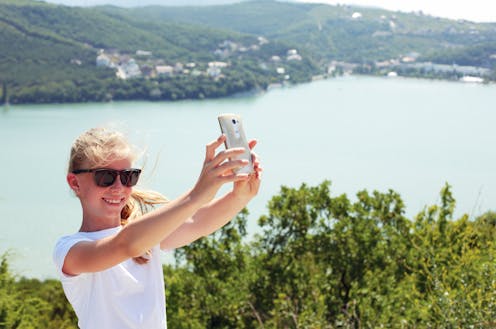From selfie injuries to viral stunts, social media can be risky for children. Could a ban help?
- Written by Samuel Cornell, PhD Candidate - Social Media and Communication, School of Population Health, UNSW Sydney

Australia is one of several countries[1] currently considering a social media ban for children. Nationally, there are calls to raise the age[2] a young person can legally use social media from 13 to 16, while South Australian premier Peter Malinauskas[3] is leading calls to raise the age to 14.
The idea of a ban has not been without controversy. But the idea is to effectively put legal boundaries on the age children can access social media, to keep kids safe and protect their health.
Politicians such as Malinauskas acknowledge that such a ban may not be completely effective, but argue measures such as age limitations should be considered[4], in the same way age limits are in place for smoking, alcohol use and driving.
Our research[5] into risk-taking behaviour associated with social media use shows the harmful repercussions of social media use do not only happen online, or just affect mental health. There are many real physical risks that stem from social media use, particularly for children and young people.
As such, from a public health[6] perspective, we argue a ban on social media use for children is worth considering.
From selfies to stunts
Many children and young people have been injured or died as a result of trying to take photos in dangerous places[7] – such as at cliffs or waterfalls – for social media. Research has shown children and adolescents are most at risk for selfie-related incidents, with at least 109[8] deaths worldwide since 2008.
Others have suffered injuries from taking part in viral challenges. For example, in the “skull breaker[9]” challenge, shared widely on TikTok in early 2020, two children would kick the legs from under a third, making them fall over. The results of this stunt included severe spinal injuries, hospital admissions, and even children being charged with assault.
Around 2018, the “Tide pod” challenge went viral, encouraging children to eat laundry detergent[10] capsules. The repercussions of doing so can include vomiting, breathing difficulties and loss of consciousness.
A popular stunt called the “blackout challenge”, which proliferated on TikTok and was particularly popular with children, led to the death of at least 20 children[11] in 18 months around the world. The challenge involved children holding their breath, or cutting off their supply of air, until they blacked out.
Children are much more likely to engage in these sorts of risky behaviours[12] than adults are. Children are still forming their identities, pushing boundaries, aiming to gain approval from their peers, and learning about risk[13].
The scale of social media
Social media algorithms are quick to promote the most appealing content, so risky stunts can go viral quickly – potentially exponentially increasing the harm.
Dangerous activities, such as taking selfies and photos in precarious poses and locations, often garner lots of views and “likes” on social media. And children want to be liked and seen as popular online, with many aspiring to be influencers[14] over and above regular professions.
If we restrict children from using social media, it doesn’t mean they won’t take risks. Children have always naturally pushed boundaries and taken risks[15], and some play can be dangerous.
But social media pushes risky activities and behaviours to children en masse, at a scale previously impossible.
Continued controversy
Academics[16], parents[17] and children themselves[18] have argued a ban is not the answer to the harms social media is having on childrens’ health and wellbeing.
Much of the discussion against a ban makes the case that social media has benefits for honing children’s digital literacy[19], community building and online support networks. Groups including LGBTQ+ advocates[20] have pointed out that a ban would remove an outlet they say is essential for their mental health and sense of community.
Other experts believe a ban is the right move, arguing social media is disrupting teenagers’ identity development[22], increasing rates of anxiety and depression[23], and fuelling polarisation.
But the link between social media use and risk-taking behaviours in the real world is often neglected in the discussion. Alongside other benefits, putting a stronger age restriction on social media use may reduce the likelihood of children engaging in dangerous viral challenges and risky stunts seen online.
Implementing and enforcing a social media ban for children would face push back from both industry and the public, and would not be without technical challenges[24].
But if we know a product is causing harm to children, regardless of some perceived benefits, it’s only right we take action to protect them.
References
- ^ several countries (www.theguardian.com)
- ^ raise the age (theconversation.com)
- ^ South Australian premier Peter Malinauskas (theconversation.com)
- ^ should be considered (theconversation.com)
- ^ research (www.jmir.org)
- ^ public health (onlinelibrary.wiley.com)
- ^ take photos in dangerous places (theconversation.com)
- ^ at least 109 (academic.oup.com)
- ^ skull breaker (www.bbc.co.uk)
- ^ to eat laundry detergent (www.washingtonpost.com)
- ^ at least 20 children (www.independent.co.uk)
- ^ engage in these sorts of risky behaviours (www.ncbi.nlm.nih.gov)
- ^ learning about risk (www.sciencedirect.com)
- ^ with many aspiring to be influencers (www.prospectmagazine.co.uk)
- ^ taken risks (www.jstor.org)
- ^ Academics (theconversation.com)
- ^ parents (www.theguardian.com)
- ^ children themselves (www.skynews.com.au)
- ^ children’s digital literacy (www.degruyter.com)
- ^ LGBTQ+ advocates (www.theguardian.com)
- ^ Pixabay/Pexels (www.pexels.com)
- ^ identity development (theconversation.com)
- ^ rates of anxiety and depression (www.tandfonline.com)
- ^ technical challenges (www.theguardian.com)

















